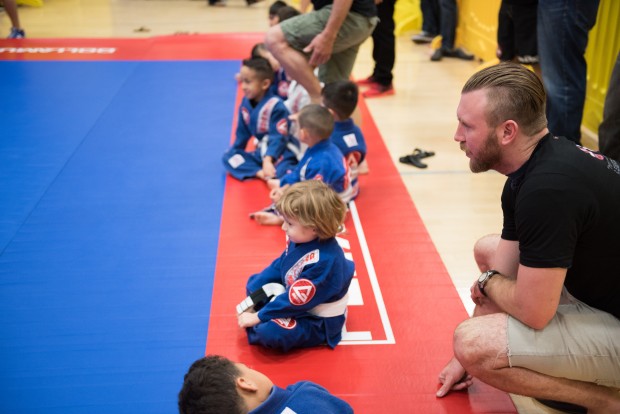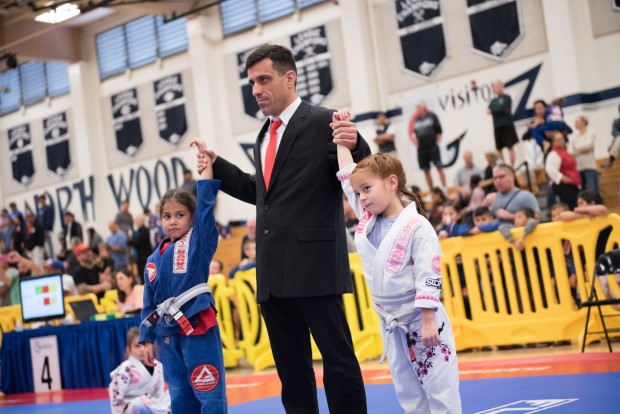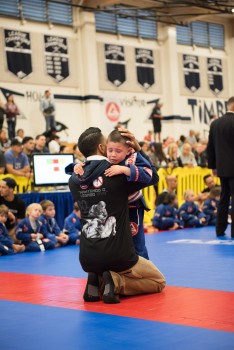GB Blog: CHILDREN x COMPETITION
Recently, GB won four trophies – 3rd place overall, 1st place Children, 1st place Junior and 2nd place Teenagers – in one of the largest children’s competitions in the world, Pan Kids 2016 (IBJJF). This event can show to the world a little of what we can expect for the future.
Children from the pre-mirim to teenagers experienced a little of what is to fight in a high-level competition. The children experience goosebumps, responsibility and all other emotional factors that adults are used to, but in a different way. Therefore, dealing with a kids competition is not an easy task.
The sports world serves as a gauge of what is transmitted in the mats. Watching a little GB warrior in action is a reflection of the work provided by the instructor. From the respect for the opponent to the time to celebrate (or not) the victory. That child audience will repeat exactly what they have as an example. Today’s blog brings the main points to be worked out within GBK classes before the kids step a competition mat for their very first time.

When we transmit GB philosophy in the right way, competitions become a very positive tool for our students. The competition encourages children to have a bigger reason to keep training more and more.
We must make it clear that the competition is not the final purpose of Jiu Jitsu, and that training is not just for those who want to fight. The real great victory of the gentle art is to see our students becoming strong adults, earning their black belts and entering college! As children, they must understand that the competition is just a “fun event”, which is repeated several times during their journey in bjj and that helps us grow as gentle art lovers.
Joining a competition takes us out of our comfort zone and leads us to improve ourselves in every way, regardless of winning or losing that specific tournament. As teachers, we need to teach our little guys from the GBK classes to love the challenge. We must teach them that when we decide to compete, we need to train harder, be even more focused, eat healthier, sleep better, do everything we can in a better way. Explaining all that to GBK students is essential for them to understand that these are essential steps to increase their chances of victory.

When the big day arrives, gather all the students and tell that, at that time, all of them are already winners, as they are much better Jiu Jitsu practitioners compared to what they were before all that preparation.
Be sure to convey to your little students that regardless of winning or losing, their teachers and parents will continue to love them the same way. At this point, the main thing is to clarify that they have to “fight hard and have fun.”
WHEN WE DON’T BRING THE GOLD MEDAL BACK HOME
One of the rules we have in our children’s competition team is: no one is allowed to cry. Among those conversations about how to behave in front of the judges, opponents’ coaches and competitors, we agreed that crying is something “unacceptable.” Show the little warriors that we must represent Gracie Barra in the best possible way.
As for crying in defeat, the message that is best absorbed by them is: “There is no reason to cry when we lose.” Children from 3 to 6 years old do not have much control over their emotions. In such cases, crying is even acceptable. But when we talk about 7 years-old students, they must learn to control the emotions and not make any unpleasant scene.
 We must teach our young champions to see that the value of a loss is in the ability to learn and improve. If the emotion just comes up, they will be trained to look at us (teachers), and ask for a time until they can control themselves and come back to talk. It is always good, especially during training prior to an event, to emphasize that we are aligned with the philosophy of the Grand Master Carlos Gracie Sr.: “In Jiu Jitsu or you win or you learn.”
We must teach our young champions to see that the value of a loss is in the ability to learn and improve. If the emotion just comes up, they will be trained to look at us (teachers), and ask for a time until they can control themselves and come back to talk. It is always good, especially during training prior to an event, to emphasize that we are aligned with the philosophy of the Grand Master Carlos Gracie Sr.: “In Jiu Jitsu or you win or you learn.”
Many actions can be taken to minimize this type of behavior. Something extremely important – that makes a big difference in the day before the championship – is to organize a meeting with those little competitors’ parents. At that meeting we can talk about everything one should expect from the event; topics that address what they (parents and children) will experience (subjects as: bringing food, delays, judges error, etc.). That is an opportunity to explain to the parents what to tell the children before and after the competition.
Did you like it? Leave here your comments about your experience with GBK students.
